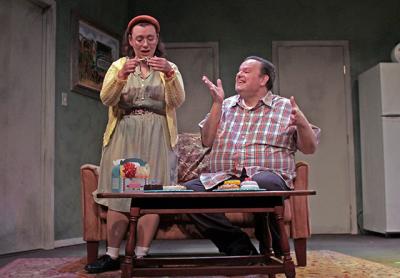What’s So Funny About Dignity and Compassion?

In a time when tolerance, compassion, and human dignity seem in short supply, theatergoers can enjoy a major dose of all three at the Hampton Theatre Company in Quogue, where Tom Griffin’s “The Boys Next Door” is running now through April 8.
But don’t forget your Kleenex. This sentimental 1986 play, set in a communal housing project for the mentally handicapped, plucks heartstrings with an effortless touch. It is also very funny, and blessedly devoid of sanctimony. As written by Mr. Griffin, we are invited to laugh both with and at these challenged characters, who are funny, absurd, sympathetic, and maddening all at once. Just like the rest of us.
The set depicts a typically drab but homey state-appointed apartment, where four men play out their various trajectories. Arnold, self-described as “basically a nervous person,” suffers from severe paranoia yet harbors a dream of moving to Russia. Norman, on the other hand, is addicted to doughnuts and wants to marry Shelia, another handicapped person living in the complex. Lucien P. Smith has the mind of a 5-year old, though the state wants to terminate his benefits and return him to society. And Barry pretends to be a golf pro, all the while dreading an impending visit from an abusive father whom he both fears and loves.
Overseeing the group is Jack, a state appointee in charge of the four men but who is burning out from the demands of his job. As played by Paul Velutis, Jack is given the difficult task of narrating the play in various asides. These long interruptions can stall the drama’s rhythm, though Mr. Velutis does well in building a rapport with the audience.
The emotional center of the play is inhabited by Shelia and Norman, beautifully played by Jessica Howard and Scott Hofer, whose innocent pursuit of each other is both touching and highly emotional. (When Norman’s strange obsession with a set of keys he wears on his hip — “I can’t get into things without my keys!” — is shared by Shelia, you know this is a match made in heaven.)
Mr. Hofer especially stands out in this production, uncannily inhabiting this sweet-natured character with his dramatic physical tics. In the hands of a lesser actor, Norman might come off as histrionic, or worse, patronizing, as the character whips himself into extreme contortions when he tries to speak. Hamlet warned his actors to “not saw the air too much with your hand,” though Mr. Hofer finds here that extravagant is the right amount. More important, he locates this character’s humor and generous humanity.
Also notable is Matthew Conlon, excellent as the urbane writer in last year’s H.T.C. production of “An Act of the Imagination.” He’s utterly transformed here, but no less effective as the mistrustful Arnold, who is in a constant state of agitation. Simple things like rugs or feminine napkins can send him into apoplexy, and Mr. Conlon gives this relentless paranoid a manic quality that is both exhausting and exhilarating to watch.
Less effective is the storyline of Barry, played in a muted performance by Spencer Scott. Perhaps his laconic style is meant to illuminate the crushing influence of a brutal and absent father, but the scenes of Barry teaching golf, for example — a sport for which he has no knowledge or aptitude — lack the comic verve they need. And when Barry’s father finally does arrive, the part seems both overwritten and overdirected. The actor playing the father, a hulking and intense Mike Boland, is already a menacing presence — he is the kind of actor who needs only walk into a room to make everyone feel uneasy. Here, though, he is asked to punctuate his pulpy dialogue with slammed doors and slapped kitchen tabletops, as if we didn’t already know he was a loathsome character.
Small missteps aside, there are other pleasures to be found in this production, including Dorian O’Brien’s charming and empathetic portrayal of the childlike Lucien. And it is a relief to watch a playwright avoid driving his ending into the maudlin ditch that this subject matter usually runs into. When it’s all over you will be moved without feeling manipulated.
“The Boys Next Door” is a sweet, affecting play filled with terrific performances, and a perfect respite from our toxic news cycle.
